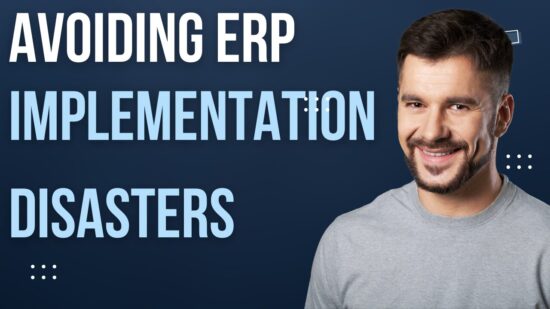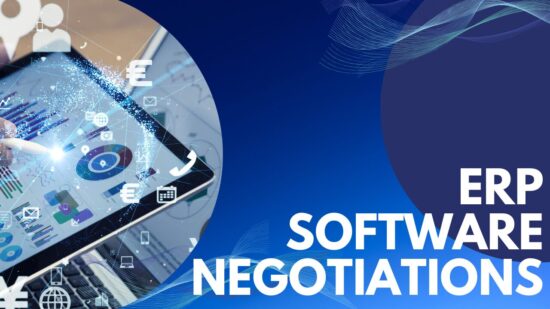Why ERP System Installation Fail – And How To Beat The Odds
The great news for small and medium-sized companies is that today’s ERP systems, if well implemented, will enable firms and organizations of all sizes and operations to access previously unattainable tools for success: better data, rapid business analytics and applications, increased operational effectiveness, reduced error rates, and lowered labor costs.
However, the not-so-great news is that most companies suffer high failure rates in choosing, implementing, and maintaining ERP systems. Gartner and McKinsey both report that about 70% of ERP implementations fail. That amounts to a decidedly underwhelming 30% success rate. Why do ERP implementations so often fail, and how can companies beat the odds and reap the promised rewards of a successful implementation?
Breaking Bad –– ERP and Its Discontents
ERP System Integrators often make what amounts to faith-based claims about their implementation capabilities. But at BACS Consulting, we rely on a more agnostic approach: actual industry and academic research and our own deep, on-the-ground project experience and well-honed knowledge base. The statistics of success for most other System Integrators selection and implementation rates are bleak. Gartner and McKinsey report that the success rate statistics are even worse. On close review, in only about half (41%) of ERP “successes” do the executive management teams report they were able to achieve the full array of anticipated cost savings, increased operational efficiencies, and improved customer satisfaction. Using these added factors, one can easily infer that almost 90% of ERP system implementations never produce the anticipated or promised results.
No matter how disappointing their ERP successes might have turned out, these same companies have nevertheless reported recouping much of their ERP investment within two years of implementation. This underscores the potential benefits awaiting companies who commit to ERP –- if done correctly, and with the right partner. Industry analysts pinpoint five crucial errors that most System Integrators and their clients make in ERP projects:
-Insufficient development of a coherent shared vision: Firms too often discover they have misaligned needs and expectations during ERP implementation. This slows down the project and drives up costs. Moreover, implementation teams are incentivized to complete their work quickly, so when delays occur, firms often change vendor teams to the detriment of overall team cohesion and project continuity.
Insufficient focus on business challenges and goals: Management too often does not commit sufficient resources and time to examine and clarify both short-term and strategic business goals, processes, and challenges. Bluntly stated, management often does not know the needs and goals of their own business. So, the most common contributor to failure entails not understanding the future needs of the business, leading to implementing a new ERP system simply to replace the old one.
-Insufficient efforts to secure crucial stakeholder input: When considering ERP options, businesses too often fail to designate and unify crucial stakeholders within their organizations. This can result in management committing to costly ERP decisions without fully learning crucial details about the interconnectedness of their own company’s operations –- missed input that can greatly diminish the returns on their ERP system investment. The crucial stakeholder is not a “doer,” but rather the person who declares whether they are satisfied or not with the new ERP system. This is typically the CFO.
-Insufficient vetting of outsourced providers: Information management providers often hold to a one-size-fits-all faith in ERP systems and tend toward a triage-mode of implementation, when smaller-to-mid-size companies and organizations have distinct operations, goals, and needs that require the blend of client-centric, close working but flexible partnership, and the technical expertise that BACS Consulting provides.
-Insufficient commitment to outcome-oriented ERP: Client companies and their outsource providers mistakenly treat ERP systems as mere IT projects rather than what they are: information organization systems –- and cultures of constant adaptability. Most business processes live in the ERP system. Most business processes are automated in the ERP system. Most business reporting and analytics comes from the data in the ERP system. So, it is imperative that the implementation of the ERP system closely mirrors the reality of both the current business as well as the future business. BACS Consulting has this very orientation to ensure that our clients realize the promise of the ERP system.
BACS Consulting: We Forge Solutions for Your Business Needs
We have a decidedly different but proven model for delivering ERP solutions for our clients’ challenges. It begins with our commitment to partnering with our clients. Our proven model pivots on constantly adopting and adapting new tools best suited to our clients’ existing business cultures, which together counter the four errors that most commonly lead to ERP implementation failures:
- Learning our clients’ businesses’ core strengths and needs: We begin with a deep dive documentation of our clients’ business goals, challenges, getting our client company’s stakeholders’ direct input. We then generate the outcome-oriented ERP plan tailored to their needs, complete with on-point schedules, budgets, and product and implementation options. Using our approach will build leadership and team strength to enable a successful implementation.
- Taking a holistic approach: We focus on the interconnectedness of our client companies’ departments –– and not only the ERP product and protocols to transform their individual operation capabilities but also to reinforce each other’s efficiency and effectiveness in everything from communications to decision making.
- Delivering technical expertise and adaptability: We assign staff whose technical skills and team capabilities mesh across multiple disciplines, including strong ERP/business processing, computing, and communications skills. Our diverse team includes both seasoned data/information management experts and “digitally native” techs (millennial and Gen Z team members). Together, they serve to help our clients’ stakeholders adopt and adapt to new information systems, protocols, and procedures that optimize our clients competitive advantage.
- Keep the focus on meeting our clients’ end-customers’ expectations: We keep a two-point perspective always in view, i.e., providing our clients the ERP system and implementation to make our clients’ companies more efficient and nimble in increasingly volatile markets –- and helping each of our clients deliver the ideal experience…product…and/or service for every one of their customers, every time.
We are, at core, problem solvers. We commit to and deliver a client-centric, solutions-focused approach in every phase of a project. We begin by working closely with our clients’ team stakeholders before undertaking any ERP implementation precisely to discover and resolve any potential conflicting stakeholders’ expectations before they could impede a project and drive up costs. Instead of incentivizing one-size-fits-all ERP choices and artificially compressing project schedules –- the industry norm –– our close, client-centric approach delivers ERP solutions tailored to our clients’ specific needs. We achieve this without subjecting our clients to the industry norms of costly project delays, changes of vendor teams, and the resulting disruption of team cohesion and project continuity.
Eyes on the Prize
For many small-to-midsize enterprises, benefiting from information management technologies often begins with investing in ERP. We can assist in choosing, implementing, and maintaining the right ERP suite best suited to help our clients’ company or institution gain the competitive advantage by:
- Delivering projects on time
- Reducing inventory costs
- Ending purchasing errors
- Improving production efficiencies
- Optimizing job costings
- Increasing cash flow
- Lowering operational costs
- Optimizing business processes and automate business process where appropriate
At BACS, we live by the axiom, “Show, not tell.” We have achieved a documented 93 % success rate in ERP implementation, quite a telling show in contrast to the industry norm. Our skill set is as diverse as our client base. And that diversity is our strength –– diversity in technical skills, information management projects, and corporate/institutional fluencies. But our greatest strength is how we integrate these diverse strengths into a unified, award-winning team that delivers every time, for every client.
Contact BACS Consulting for more information without a sales pitch: www.BACSCG.com, Rkoski@BACSCG.com or PAdams@BACSCG.com. 650-383-4248







